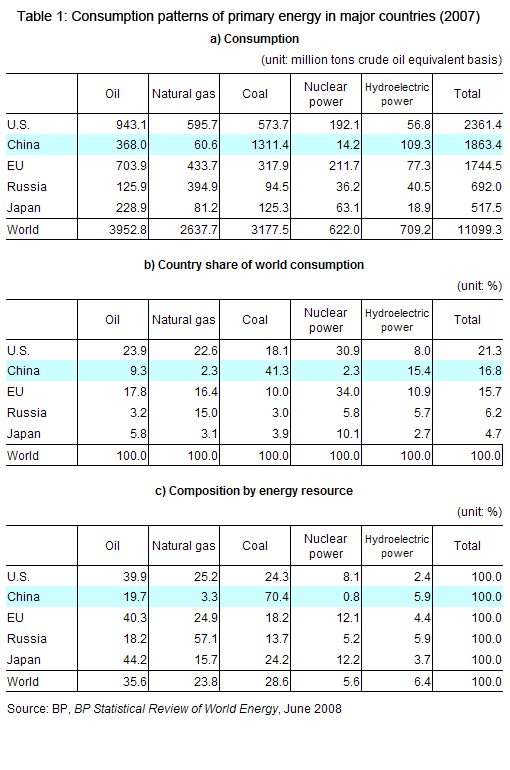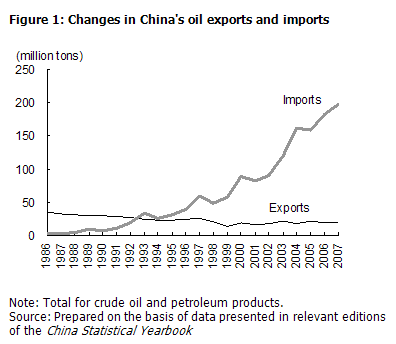Crude oil prices have soared from around $20 per barrel in 2002 to beyond $130 per barrel now, a record high that is about twice the level a year ago. Surging demand in China, which has grown into a huge energy consumer, is said to be one factor driving the price of crude oil higher. The rise in oil prices is in turn raising for the Chinese economy the specter of stagflation, in which stagnation and inflation occur simultaneously.
China's Emergence as a Major Player in the Oil Market
Energy demand is growing rapidly in China, driven by its rapid industrialization and motorization. China has already become the second-largest energy-consuming nation in the world, after the United States.
According to statistics released by BP, the oil major based in Britain, primary energy consumption in China nearly doubled, from 961 million tons (oil equivalent) in 1997 to 1,863 million tons in 2007. China's share of global primary energy consumption also rose from 10.8% to 16.8% in the same 10 years (tables 1a and 1b). Meanwhile, the U.S. share of global consumption fell from 24.8% to 21.3% over the same period. It is only a matter of time before China overtakes the U.S. to become the world's largest energy consumer. In fact, China accounted for approximately 40% of the global primary energy consumption growth from 1997 to 2007.
Petroleum is the main source of the primary energy structure of advanced nations, including Japan, the U.S., and European countries. In contrast, coal continues to provide 70% of China's primary energy consumption, while petroleum's share remains at around 20% (table 1c). Still, China consumed 368 million tons of petroleum in 2007. This represented 9.3% of global petroleum consumption for the year, and easily surpassed the 229 million tons consumed in Japan (5.8% of global petroleum consumption). Expanded demand in China accounted for approximately one-third of the increase in global petroleum consumption during the period from 1997 to 2007.
China was originally a net oil exporter, but as domestic demand rose, that position changed to net oil importer in 1993, and the volume of net oil imports has continued to grow rapidly. According to trade statistics published by the Chinese Ministry of Commerce, China imported 197 million tons of crude oil and petroleum products in 2007. The country's net oil imports, calculated by deducting its oil exports, reached 178 million tons (figure 1). China's oil trade deficit amounted to $85 billion, or 2.6% of its GDP, in 2007, as the higher crude oil prices combined with import growth. China is on its way to overtaking Japan as the world's second largest oil importer, after the U.S.
Additional Blow to Economic Slowdown
Rising crude oil prices have a number of negative repercussions for the Chinese economy, which relies on imports for approximately half of the petroleum it consumes.
First, higher crude oil prices worsen China's terms of trade (relative export prices in relation to import prices) and, by extension, reduce the purchasing power of its income. China's oil trade deficit, mentioned above, will double and its net import bill swell by $85 billion (equivalent to 2.6% of its GDP) if crude oil prices, which averaged $70 per barrel last year, double to hit $140 per barrel. This is tantamount to transferring income from China to oil exporters. It places a burden on Chinese citizens in the forms of falling corporate earnings and rising consumer prices. It may also have adverse implications for investment and consumption.
Second, crude oil price increases represent higher production costs for companies (local and foreign) in China. The price hikes push inflation on one hand and reduces production on the other. The increases will hit energy-intensive industries, including transportation, steel, and chemical manufacturing, particularly hard.
Third, China's exports and production will be adversely affected by the slowdown in the global economy - the advanced countries in particular, which are China's main export destinations - resulting from the increase in crude oil prices.
The Chinese economy is beginning to enter an adjustment phase even before the opening of the Beijing Olympics in August 2008, driven by factors such as surging inflation, the bursting of the stock market bubble, and the deceleration of the global economy. Inflation is unlikely to subside given steep rises in crude oil prices in recent months. As a consequence, the economic outlook is becoming increasingly grim.




